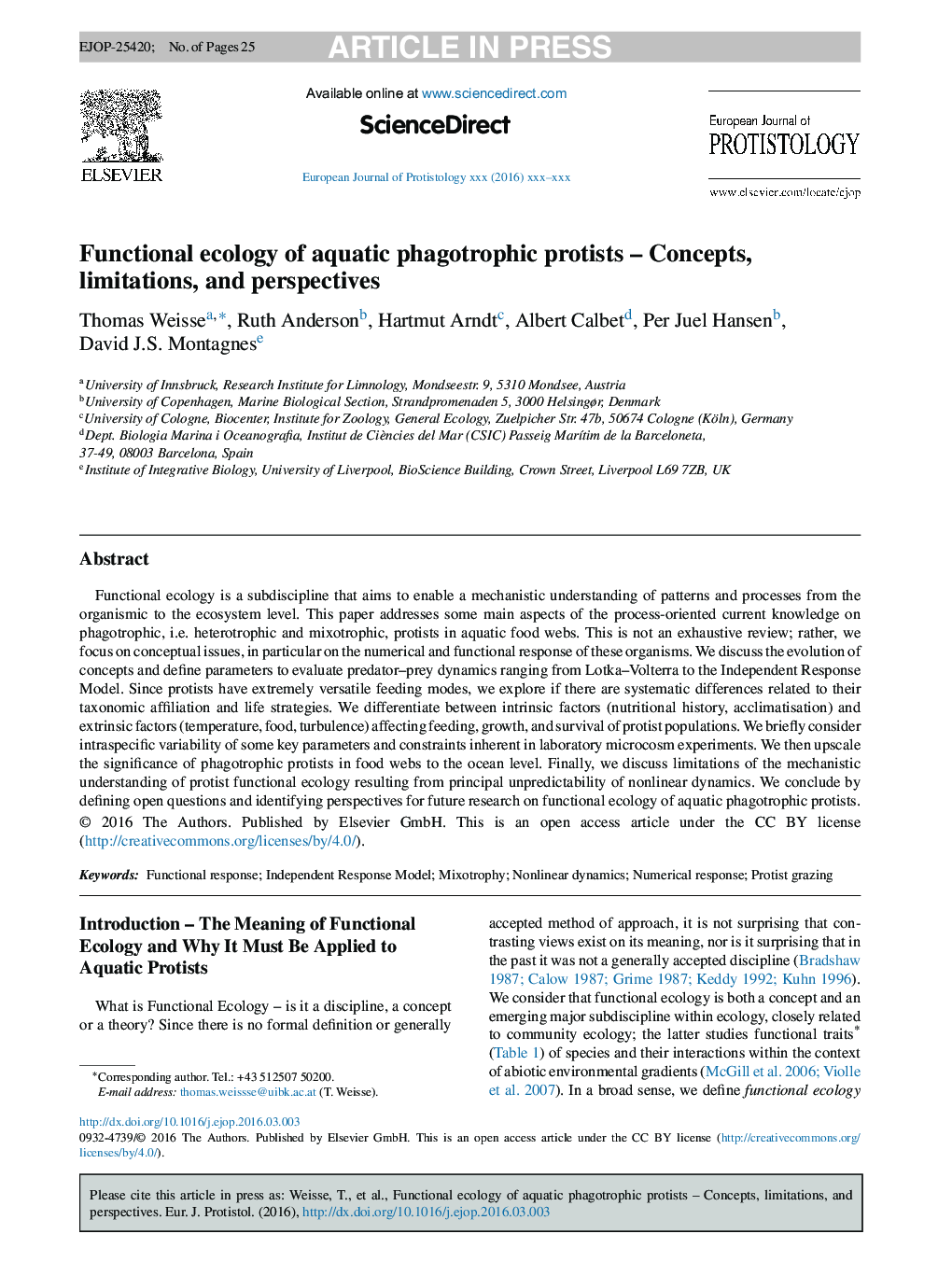| کد مقاله | کد نشریه | سال انتشار | مقاله انگلیسی | نسخه تمام متن |
|---|---|---|---|---|
| 8382974 | 1543281 | 2016 | 25 صفحه PDF | دانلود رایگان |
عنوان انگلیسی مقاله ISI
Functional ecology of aquatic phagotrophic protists - Concepts, limitations, and perspectives
ترجمه فارسی عنوان
زیست شناسی کاربردی پروتئین های فاگووتروفیک آبزی - مفاهیم، محدودیت ها و دیدگاه ها
دانلود مقاله + سفارش ترجمه
دانلود مقاله ISI انگلیسی
رایگان برای ایرانیان
کلمات کلیدی
ترجمه چکیده
محیط زیست کاربردی یک رشته متضاد است که هدف آن ایجاد یک درک مکانیکی از الگوهای و فرآیندهای موجود از ارگانیسم به سطح اکوسیستم است. این مقاله به برخی از جنبه های اصلی دانش فعلی روند گرا در مورد فاگووتروفیک ها، یعنی هتروتروفیک و مخلوطروفی، در پروتئین ها در شبکه های آبزی آب اشاره می کند. این یک بررسی جامع نیست بلکه ما بر مسائل مفهومی تمرکز می کنیم، به ویژه در پاسخ عددی و عملکردی این موجودات. ما درباره تکامل مفاهیم و تعریف پارامترها برای ارزیابی پویایی شکارچیان از لاکتا-ولتررا به مدل پاسخ مستقل صحبت می کنیم. از آنجا که پروتستان دارای حالت های تغذیه ای بسیار متنوع است، ما بررسی می کنیم که آیا تفاوت های سیستماتیک مربوط به وابستگی های طبقه بندی و استراتژی های زندگی آنها وجود دارد. ما بین عوامل ذاتی (تاریخ تغذیه، انعطاف پذیری) و عوامل بیرونی (دما، غذا، آشفتگی) که بر تغذیه، رشد و بقای جمعیت پروتیم تأثیر می گذارند، تفاوت می یابیم. ما به طور مختصر متغیرهای درونی خاص برخی از پارامترهای کلیدی و محدودیت های ذاتی آزمایش های میکروسکوپ آزمایشگاهی را در نظر می گیریم. سپس اهمیت پروتزهای فاگووتروفیک را در شبکه های غذایی به سطح اقیانوس افزایش می دهیم. در نهایت، ما درباره محدودیت های درک مکانیستی از محیط زیست عملکرد پروتئینی ناشی از غیر قابل پیش بینی بودن پویایی غیر خطی بحث می کنیم. ما نتیجه گیری می کنیم با تعریف سوالات باز و شناسایی چشم انداز برای تحقیقات آینده در مورد اکولوژی کاربردی از پروتئین فاگووتروفیک آبزی.
موضوعات مرتبط
علوم زیستی و بیوفناوری
علوم کشاورزی و بیولوژیک
علوم کشاورزی و بیولوژیک (عمومی)
چکیده انگلیسی
Functional ecology is a subdiscipline that aims to enable a mechanistic understanding of patterns and processes from the organismic to the ecosystem level. This paper addresses some main aspects of the process-oriented current knowledge on phagotrophic, i.e. heterotrophic and mixotrophic, protists in aquatic food webs. This is not an exhaustive review; rather, we focus on conceptual issues, in particular on the numerical and functional response of these organisms. We discuss the evolution of concepts and define parameters to evaluate predator-prey dynamics ranging from Lotka-Volterra to the Independent Response Model. Since protists have extremely versatile feeding modes, we explore if there are systematic differences related to their taxonomic affiliation and life strategies. We differentiate between intrinsic factors (nutritional history, acclimatisation) and extrinsic factors (temperature, food, turbulence) affecting feeding, growth, and survival of protist populations. We briefly consider intraspecific variability of some key parameters and constraints inherent in laboratory microcosm experiments. We then upscale the significance of phagotrophic protists in food webs to the ocean level. Finally, we discuss limitations of the mechanistic understanding of protist functional ecology resulting from principal unpredictability of nonlinear dynamics. We conclude by defining open questions and identifying perspectives for future research on functional ecology of aquatic phagotrophic protists.
ناشر
Database: Elsevier - ScienceDirect (ساینس دایرکت)
Journal: European Journal of Protistology - Volume 55, Part A, August 2016, Pages 50-74
Journal: European Journal of Protistology - Volume 55, Part A, August 2016, Pages 50-74
نویسندگان
Thomas Weisse, Ruth Anderson, Hartmut Arndt, Albert Calbet, Per Juel Hansen, David J.S. Montagnes,
